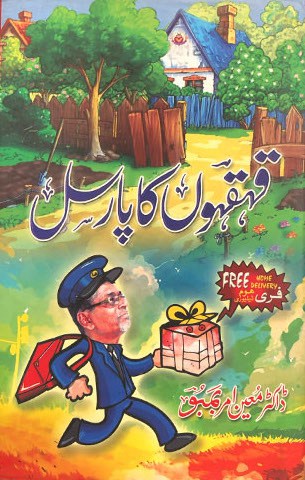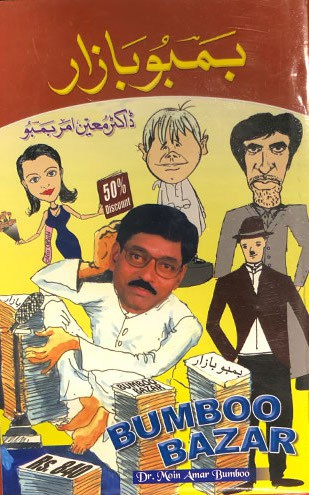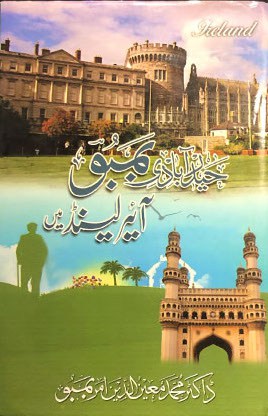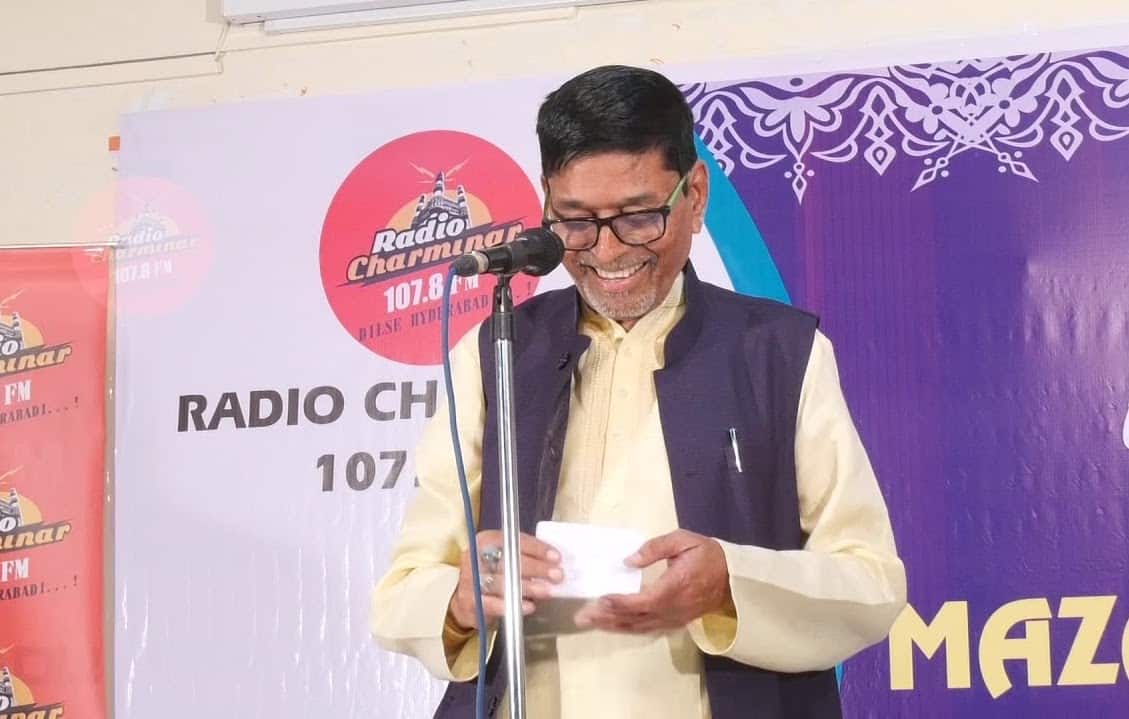After the formal inauguration of prosody classes at the famed Urdu Hall Himayat Nagar in the fall of 2020, some of Hyderabad’s humour poets regaled audiences with their verses. When baritone-voiced Waheed Pasha Quadri finished crooning some of his lines, a physically as well as artistically towering personality then positioned himself at the pulpit.
This tall veteran of the Deccani Humour scene announced his presence with the following words, “Pehle kuch siasi aur thode sanjeeda chawwe maar toon phir main apni auqaat pe aaja toon (First I’ll read some political, somewhat serious verses then I’ll come down to my level).”
This self-deprecating poet who autographs his published poetry collections under various aliases like “Ap ka apna patang lootne waala (Your very own kite thief)” is actually a PhD from Osmania University. He is one of the few remnants of a time when Hyderabad’s humour poetry scene saw more prosperous times.

A Bamboo among a Gilli and Danda
Ever since 1948, mazahiya shayari genre experienced a renaissance in the areas that constituted the Nizam’s Princely State, a diverse array of humourous versifiers flourish. Every one of these poets-cum-funnymen had distinct styles — be it their ways of reciting, diction, or the how racy their material is.
After the tragedy that was Police Action, Himayatullah’s, Sarwar Danda’s, and Sulaiman Khateeb’s mix of hilarious content taught people how to laugh again. Those from Telangana districts like Gilli Nalgondvi sprinkled more Telugu words than others all over their poems. In more recent times, prosody-master Shahid Adeeli is known for his chaste command over Urdu and flawless recitation. This is due to his family’s poetic lineage that has links to the Dabistans of Lucknow, Delhi, and Hyderabad.
Bamboo’s friend and Urdu Evening Arts College classmate Syed Naseeruddin Ahmed — known better by his pen-name Bogus Hyderabadi — initiated him into this fraternity during a gathering presided over by radio artist Azhar Afsar. Quoting Ahmed, Bamboo recalls his initiation.
“Unn dinon mushairon mein ‘Danda’ maujood tha. ‘Gilli’ bhi fiza mein khoob udd raha tha. ‘Belan’ bhi paapad bail rahi thi.” Leken ek ‘Bamboo’ ki kami thi. (In those days, mushairas had a Danda. Gilli was also dominating the airwaves. “Belan” was making poppadums. But one “Bamboo” was lacking).”
Tasteless or terrific?
Dr. Moinuddin Amar, also known by his pen-name “Bamboo” is aware that people find his poetry either crass or commendable.
For instance, in front of the then Andhra Pradesh Chief Minister NT Rama Rao at a mushaira at the Exhibition Club, he recited this chawwa (a four-lined poem) which almost brought the state intelligence’s oversight upon him. This was around the time when the Telugu Desam Party founder married a much younger Lakshmi Parvati.
Ghar mein baithe na kahin aarain na jaarein Anna
Ab aakhri umar mein kya josh dikha rein Anna
Lakshmi Parvati hai 35 ki aur 70 ke innu
Lorry ka license rakh ke Luna chala rein Anna
(You are just sitting at home Anna
Why the energy in your elderly age Anna
Lakshmi Parvati is 35 and he is 70
Anna is driving a Luna )
However, NTR’s initial protestations of “Em? Em? (What? What? In Telugu)” were eclipsed by the thunderous laugher that erupted throughout the venue following those four lines.
Many would consider that tasteless and not “woke” in today’s times.
Contrary to popular thought, Bamboo’s repertoire doesn’t just consist of such hysterical, yet off-colour verses. Just like every other humorous poet, he doesn’t only lampoon his spouse, in-laws, the institution of marriage (which he has entered more than twice) or political leaders.

When people confused him for a medical doctor simply because he earned the title of Dr. after completing his PhD, he wrote the following.
Doctor to ban gaya hoon PhD ke baad mein
Din raat woh sataane lagae hai main kya karoon
Jaahil hai basti waale mere Bamboo iss qadr
Ghar pe mareez aane lage hai main kya karoon
(I’ve become a Doctor after getting a PhD
Everyday they bother me, what should I do
The uneducated folks
They venture to my house with patients, what should I do?)
With Devanagri script slowly supplanting the Urdu script, his heart also bleeds for the language in which he honed his craft.
Aj ka shayar Urdu ghazal ko Hindi mein likhe
Baat badi hai iss ko har-giz samjho na tum chhoti
Urdu ghazal ka Hindi mein deewan chhappa hai Bamboo
Hindi ki plate mein hai Urdu ki roti
(Today’s poet writes an Urdu ghazal in Hindi
This is a big deal, not a small matter
The Urdu ghazal has its collection printed in Hindi
In Hindi’s plate is Urdu’s sustenance)
‘Mera Naam Bamboo’
Like Raj Kapoor’s character in the cult-classic Mera Naam Joker, life hasn’t exactly been roses for Moin Amar Bamboo. Much before the musharias as well as two published collections — Bamboo Bazaar and Qehqahon Ka Parcel – he didn’t have it easy.
“I was so manhoos (unlucky) that not even a year after my birth, my Dad died,” says Bamboo.
Still young, his mother was advised by his paternal Grandmother to enter into another marriage as the latter offered to raise him. No matter how tough times got, she ensured he was fed. Sometimes she even used to take leftover lukhmis from weddings to make sure he never went hungry.
Though after his Grandmother’s death, he sold guavas on a push cart to make ends meet. But he never asked anyone for money.
That too, in spite of having an extended family that comprised well-to-do contractors.
When those family members saw him earning money by selling fruits, they always said, “Don’t embarrass our family by earning money through menial means.”
Bamboo protests, “Did I steal from or con someone? Did I beg? These people had a problem with the way I earned my sustenance on the street but they never once tried to find out if I was going to sleep hungry or not.”
The extended family also didn’t understand why he was earning to study instead of becoming a labourer rather than becoming a street side fruit seller. On top of not being supportive, his paternal uncle once took him to Bagh-e-Aam and pushed him away onto the road saying “Even you die, no one will ask for a share from your fruit-selling venture.”
Yet he made it to Osmania University. Renowned Professor Moghni Tabassaum instructed him to do his PhD research on Sab-Ras Magazine, which is the organ of one of the city’s prestigious Urdu institutions, Aiwan-e-Urdu.

He replied to this request stating, “Main chichora admi hoon, waisa kuch topic do (I’m a goofy person, give me such a topic).”
Instead, he wanted to undertake research on radio dramas written by Hyderabadi authors. Bamboo submitted a 2,714-page thesis on Sab-Ras which he brought on a wagon. In 1987, his book on radio dramas was published.
After that, OU kept a page limit on thesis submissions.
He also became a Commissioner of the Tribal Welfare Department in Hyderabad.
Among the last of his kind
If anyone saw potential in Bamboo, it was Deccani mazahiya legend Himayutullah.
When introduced to him by dramatist Master Shafi, Himayatullah asked, “Is he any good? Because I can’t promote people based on relations.”
He was given a chance to recite some lines at a Zinda Dillan-e-Hyderabad mushaira at the Exhibition grounds.
“I read two verses. Another poet on the stage named Gadbad Hyderabadi started laughing and then he began coughing so hard that he collapsed. The poor guy was taken to the hospital where he then died.”
Not too long after that Himayatullah then told Bamboo, “Khaa gaye na unku na jaga banaane ke liye. Kya hai miyaan tumhaare ku rakhna ki nahin?. Sher padhte wakhat ek ku to khaajayenge tum (You ate him up and chewed him out. Now I don’t know if I should keep you. Every time you read a couplet you will ensure that someone will leave this world).”
After that, there was no looking back.
But that was another time when folks like Gilli Nalgondvi and Sarwar Danda reigned supreme. As Bamboo writes,
Mehsoos kiya dil pe jo woh keh gaya Bamboo
Kya kya na inn aankhon pe sitam seh gaya Bamboo
Mar jaaye jo fankaar to hoti hai yahaan qadar
Gilli bhi gayi Danda gaya reh gaya Bamboo
(I took to the heart whatever they said Bamboo
What have my eyes suffered Bamboo
Only when artists die are they appreciated
Gilli is gone Danda is gone all that is left if Bamboo)


